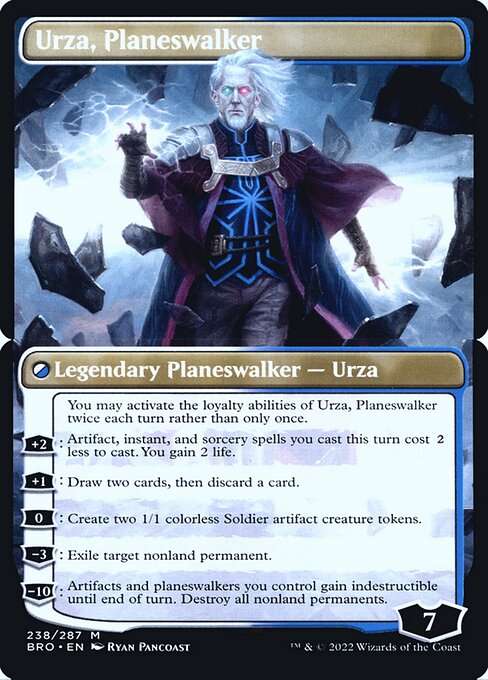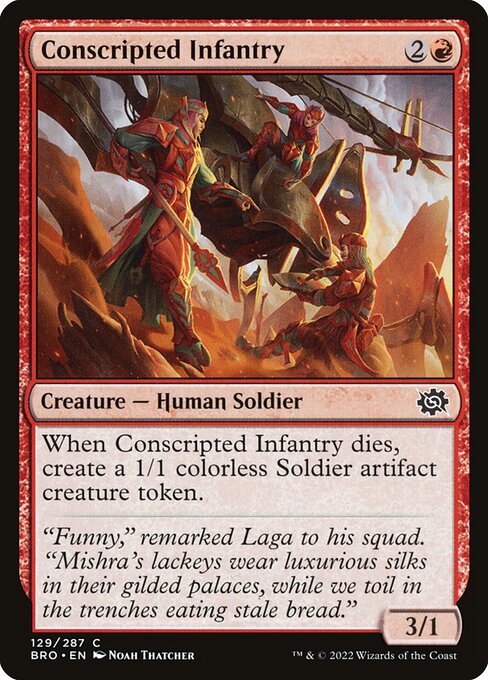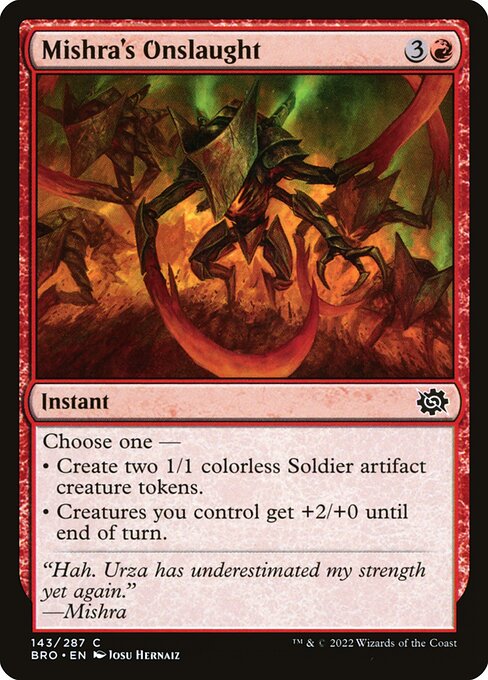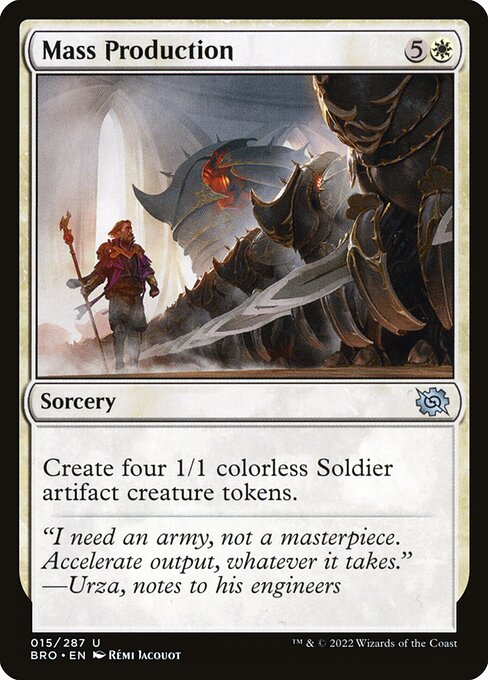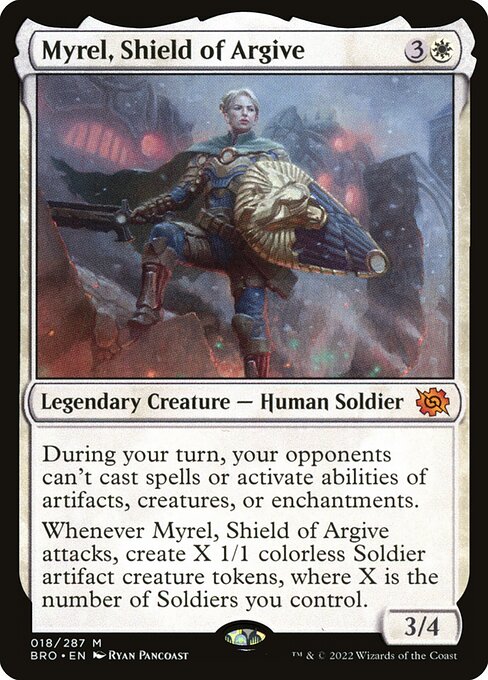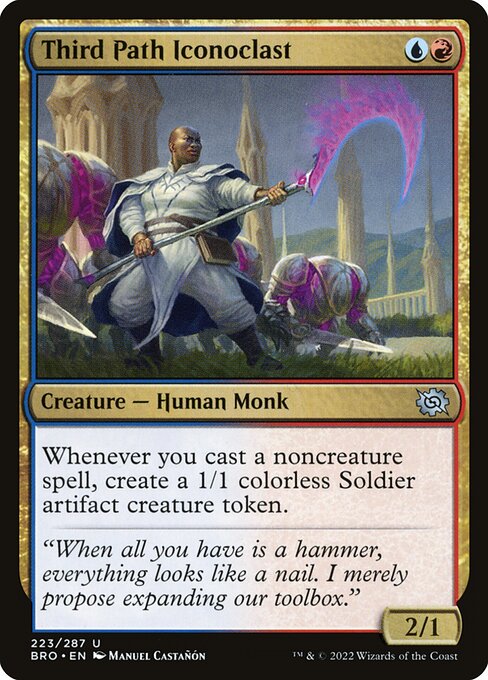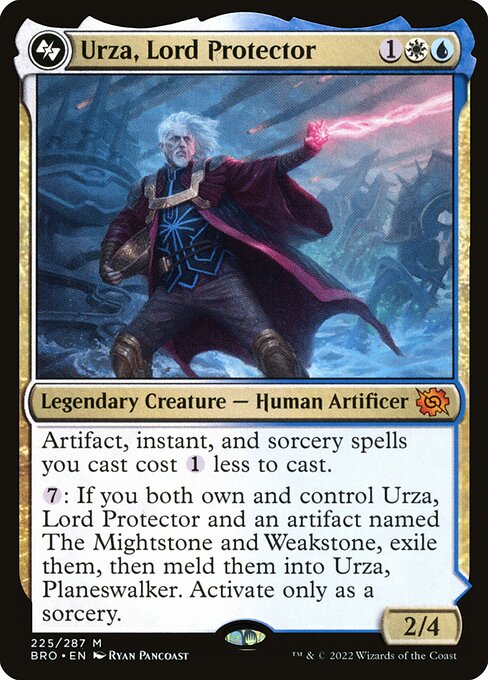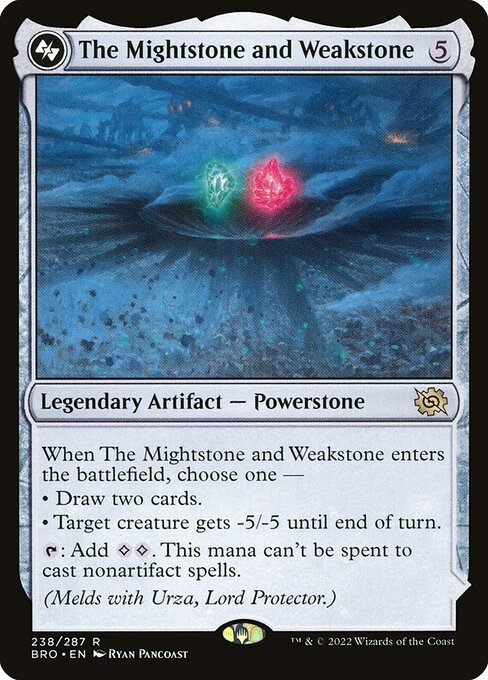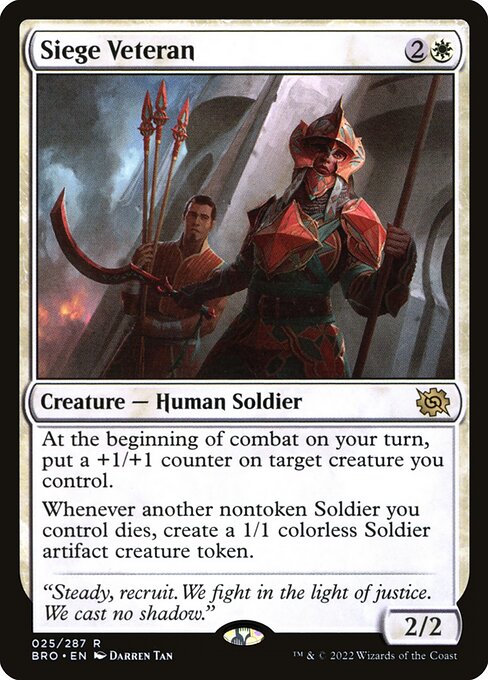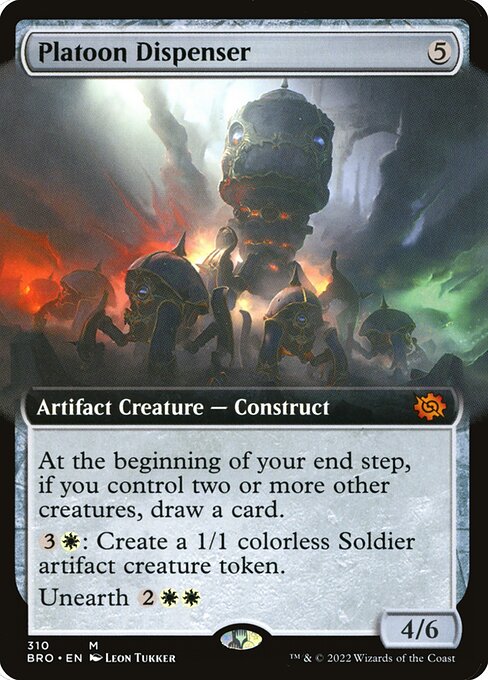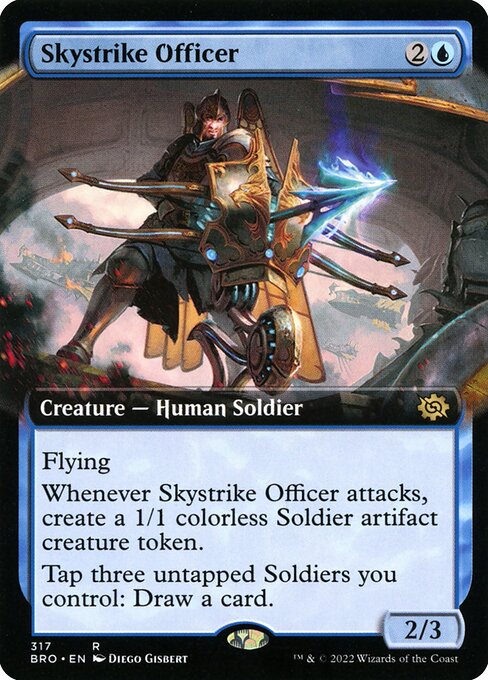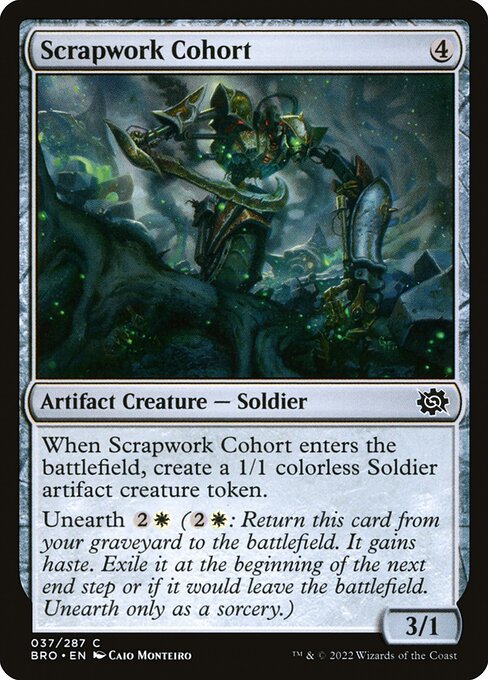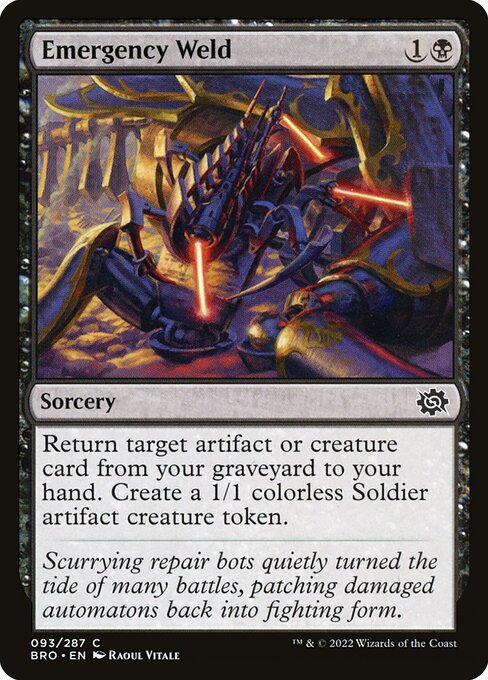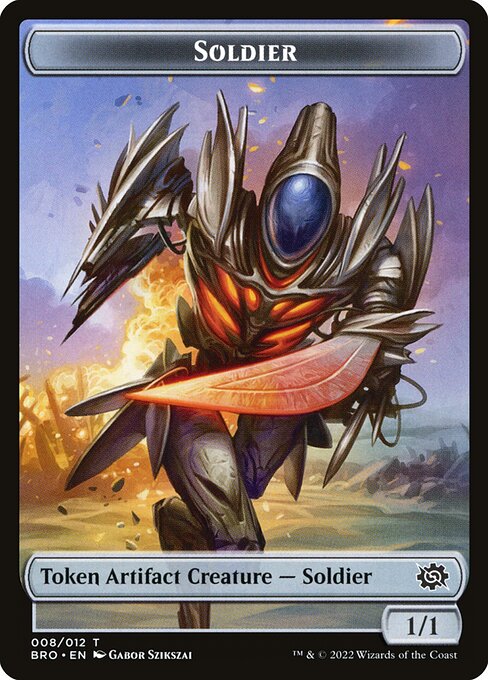Urza, Planeswalker
Legendary Planeswalker — Urza
You may activate the loyalty abilities of Urza, Planeswalker twice each turn rather than only once.
+2: Artifact, instant, and sorcery spells you cast this turn cost less to cast. You gain 2 life.
+1: Draw two cards, then discard a card.
0: Create two 1/1 colorless Soldier artifact creature tokens.
−3: Exile target nonland permanent.
−10: Artifacts and planeswalkers you control gain indestructible until end of turn. Destroy all nonland permanents.
+2: Artifact, instant, and sorcery spells you cast this turn cost less to cast. You gain 2 life.
+1: Draw two cards, then discard a card.
0: Create two 1/1 colorless Soldier artifact creature tokens.
−3: Exile target nonland permanent.
−10: Artifacts and planeswalkers you control gain indestructible until end of turn. Destroy all nonland permanents.
standard
future
historic
gladiator
pioneer
explorer
modern
legacy
pauper
vintage
penny
commander
brawl
alchemy
paupercommander
duel
oldschool
premodern
Rulings
The mana value of a melded permanent is the sum of the mana values of its front faces. A creature that becomes a copy of a melded permanent has only the characteristics of that combined back face, and its mana value is 0.
When two cards are exiled and melded, they each leave the battlefield, then return together as one new object with no relation to either of the objects that left the battlefield. Counters, Auras, Equipment, and other effects that affected those two cards don’t affect the melded permanent.
In the Commander variant, a meld card’s color identity is determined only by the mana costs and mana symbols in the rules text of its front face. No symbols or rules text of the permanent it melds into are considered.
If an effect moves a melded permanent to a new zone and then affects “that card,” it affects both cards.
When a pair of cards are melded, the result is a single creature that’s represented by two cards. If the melded creature dies, both cards are put into your graveyard. As it leaves the battlefield, both of those cards are turned face up again. If the cards are put on the top or bottom of your library, you choose their relative order.
Note that the permanent represented by the combined back faces has a color indicator.
One card in each pair of meld cards has an ability that instructs you to exile the two cards and meld them. If you control more than one object with one of those names, you select one object with that name to exile.
While a meld card is in any zone other than the battlefield, it has only the characteristics of its front face. The same is true while it’s on the battlefield with its front face up.
A player prompted to name a card may name the combined back face, and each player has the right to know that combined back face’s characteristics at all times.
While a melded permanent is on the battlefield, it has only the characteristics of its combined back face. Any effects that modify how the new object enters the battlefield will consider only the combined back face.
Only two cards belonging to the same meld pair can be melded. Tokens, cards that aren’t meld cards, or meld cards that don’t form a meld pair can’t be melded. If an effect instructs a player to meld cards that can’t be melded, those cards remain in exile.
When two cards are exiled and melded, they each leave the battlefield, then return together as one new object with no relation to either of the objects that left the battlefield. Counters, Auras, Equipment, and other effects that affected those two cards don’t affect the melded permanent.
In the Commander variant, a meld card’s color identity is determined only by the mana costs and mana symbols in the rules text of its front face. No symbols or rules text of the permanent it melds into are considered.
If an effect moves a melded permanent to a new zone and then affects “that card,” it affects both cards.
When a pair of cards are melded, the result is a single creature that’s represented by two cards. If the melded creature dies, both cards are put into your graveyard. As it leaves the battlefield, both of those cards are turned face up again. If the cards are put on the top or bottom of your library, you choose their relative order.
Note that the permanent represented by the combined back faces has a color indicator.
One card in each pair of meld cards has an ability that instructs you to exile the two cards and meld them. If you control more than one object with one of those names, you select one object with that name to exile.
While a meld card is in any zone other than the battlefield, it has only the characteristics of its front face. The same is true while it’s on the battlefield with its front face up.
A player prompted to name a card may name the combined back face, and each player has the right to know that combined back face’s characteristics at all times.
While a melded permanent is on the battlefield, it has only the characteristics of its combined back face. Any effects that modify how the new object enters the battlefield will consider only the combined back face.
Only two cards belonging to the same meld pair can be melded. Tokens, cards that aren’t meld cards, or meld cards that don’t form a meld pair can’t be melded. If an effect instructs a player to meld cards that can’t be melded, those cards remain in exile.
Rulings
The mana value of a melded permanent is the sum of the mana values of its front faces. A creature that becomes a copy of a melded permanent has only the characteristics of that combined back face, and its mana value is 0.
When two cards are exiled and melded, they each leave the battlefield, then return together as one new object with no relation to either of the objects that left the battlefield. Counters, Auras, Equipment, and other effects that affected those two cards don’t affect the melded permanent.
In the Commander variant, a meld card’s color identity is determined only by the mana costs and mana symbols in the rules text of its front face. No symbols or rules text of the permanent it melds into are considered.
If an effect moves a melded permanent to a new zone and then affects “that card,” it affects both cards.
When a pair of cards are melded, the result is a single creature that’s represented by two cards. If the melded creature dies, both cards are put into your graveyard. As it leaves the battlefield, both of those cards are turned face up again. If the cards are put on the top or bottom of your library, you choose their relative order.
Note that the permanent represented by the combined back faces has a color indicator.
One card in each pair of meld cards has an ability that instructs you to exile the two cards and meld them. If you control more than one object with one of those names, you select one object with that name to exile.
While a meld card is in any zone other than the battlefield, it has only the characteristics of its front face. The same is true while it’s on the battlefield with its front face up.
A player prompted to name a card may name the combined back face, and each player has the right to know that combined back face’s characteristics at all times.
While a melded permanent is on the battlefield, it has only the characteristics of its combined back face. Any effects that modify how the new object enters the battlefield will consider only the combined back face.
Only two cards belonging to the same meld pair can be melded. Tokens, cards that aren’t meld cards, or meld cards that don’t form a meld pair can’t be melded. If an effect instructs a player to meld cards that can’t be melded, those cards remain in exile.
When two cards are exiled and melded, they each leave the battlefield, then return together as one new object with no relation to either of the objects that left the battlefield. Counters, Auras, Equipment, and other effects that affected those two cards don’t affect the melded permanent.
In the Commander variant, a meld card’s color identity is determined only by the mana costs and mana symbols in the rules text of its front face. No symbols or rules text of the permanent it melds into are considered.
If an effect moves a melded permanent to a new zone and then affects “that card,” it affects both cards.
When a pair of cards are melded, the result is a single creature that’s represented by two cards. If the melded creature dies, both cards are put into your graveyard. As it leaves the battlefield, both of those cards are turned face up again. If the cards are put on the top or bottom of your library, you choose their relative order.
Note that the permanent represented by the combined back faces has a color indicator.
One card in each pair of meld cards has an ability that instructs you to exile the two cards and meld them. If you control more than one object with one of those names, you select one object with that name to exile.
While a meld card is in any zone other than the battlefield, it has only the characteristics of its front face. The same is true while it’s on the battlefield with its front face up.
A player prompted to name a card may name the combined back face, and each player has the right to know that combined back face’s characteristics at all times.
While a melded permanent is on the battlefield, it has only the characteristics of its combined back face. Any effects that modify how the new object enters the battlefield will consider only the combined back face.
Only two cards belonging to the same meld pair can be melded. Tokens, cards that aren’t meld cards, or meld cards that don’t form a meld pair can’t be melded. If an effect instructs a player to meld cards that can’t be melded, those cards remain in exile.
Your collection? Your decks?
Want to manage your collection and/or create decks?


 0
0
 €
€
